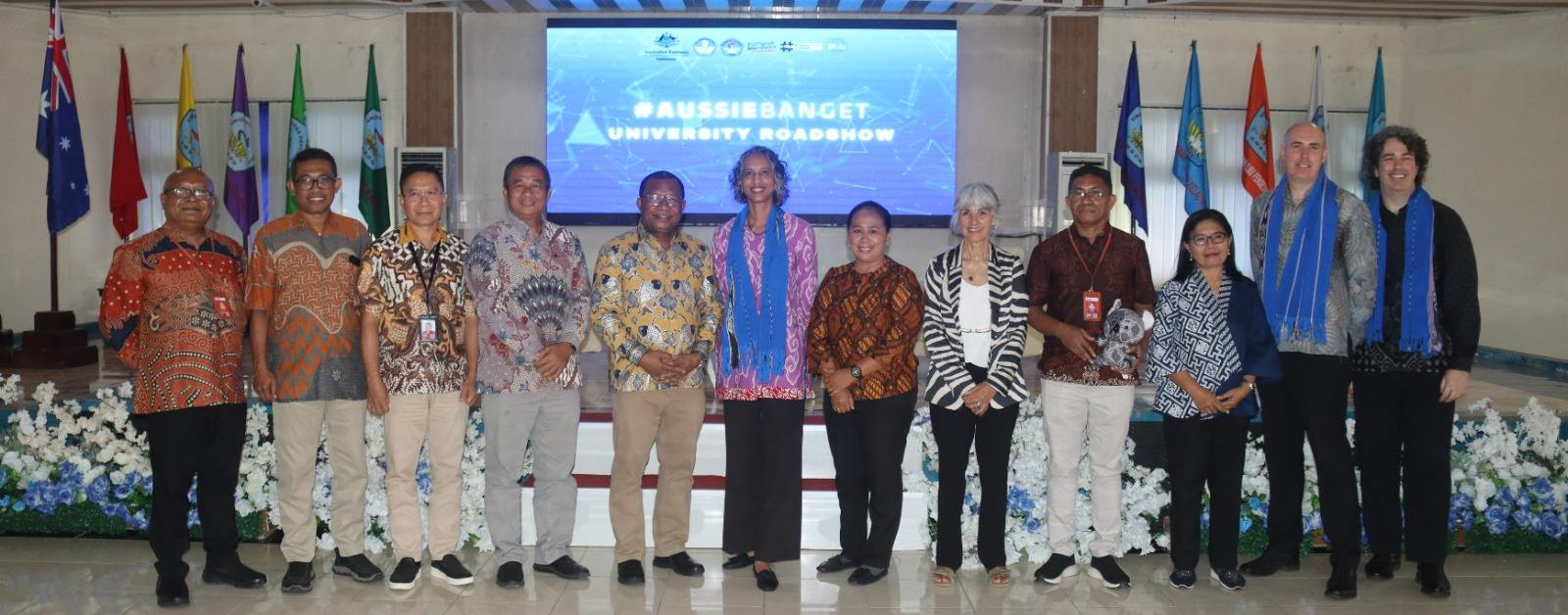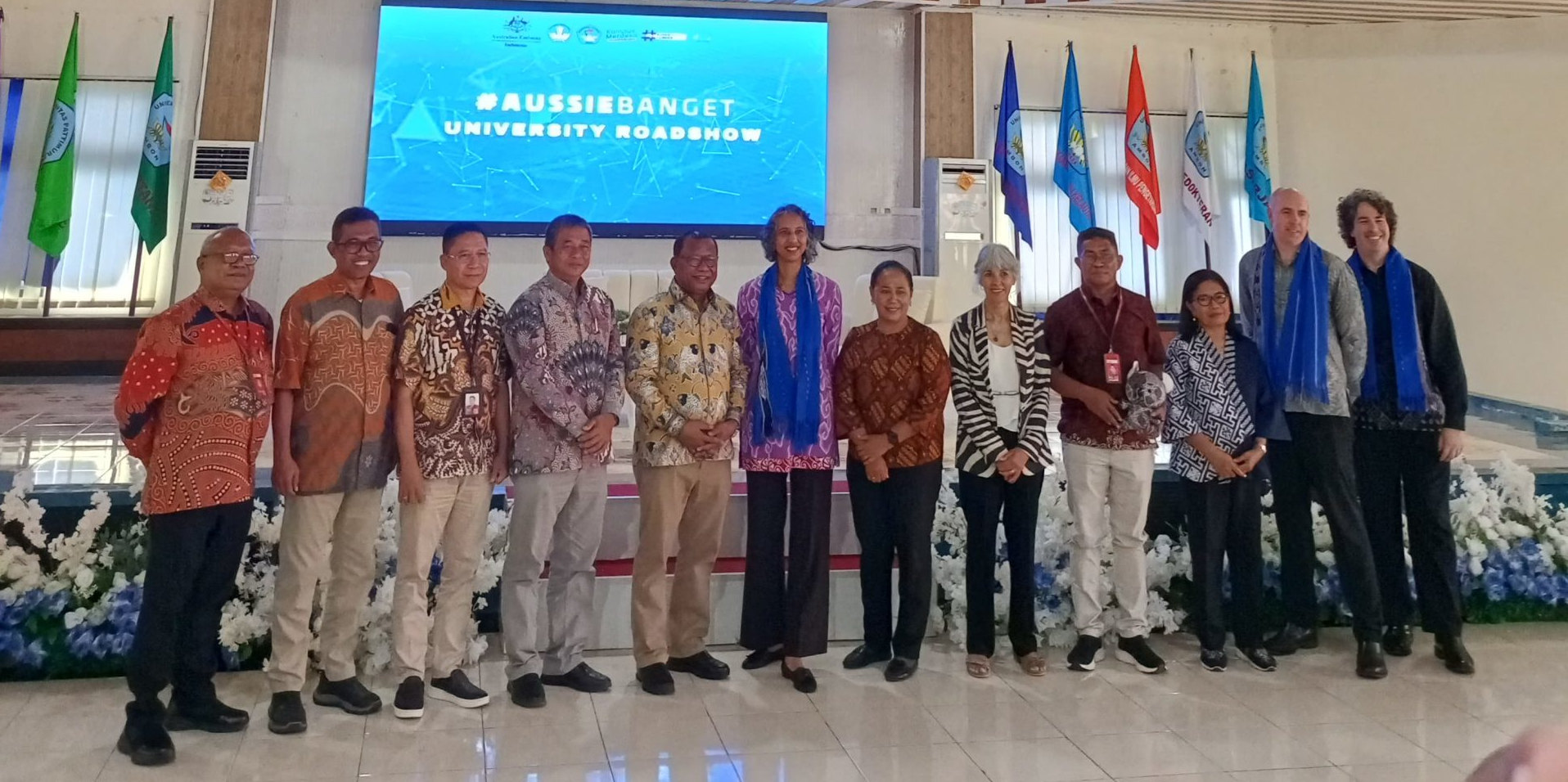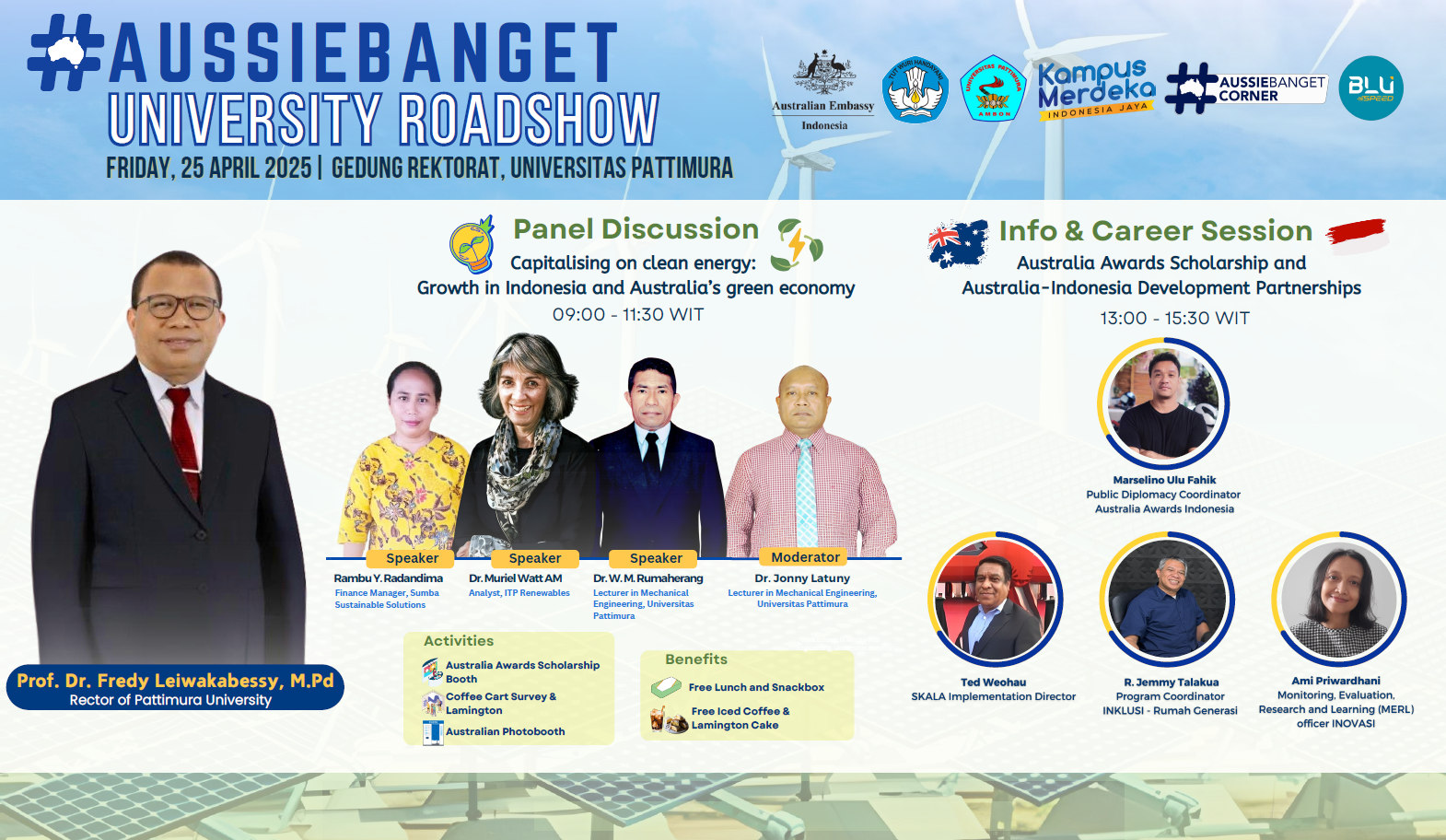During the #AUSSIEBANGET University Roadshow Event on 25 April 2025 at UNPATTI, a Panel Discussion was held. The theme is “Capitalising on Clean Energy: Growth in Indonesia and Australia’s Green Economy”. The Panel Discussion was moderated by Dr. Jonny Latuny, Head of the UNPATTI International Office, the panelists are, Dr. Muriel Watt AM, a solar power system expert who explained the development of the clean energy implementation roadmap in the form of a solar power generation system in Australia, as well as the challenges faced and the support that Australia can provide to Indonesia in the context of utilizing clean energy by providing an opportunity for Indonesia to use the standardization of the solar power generation grid system that is already available in Australia to be adjusted for use in Indonesia.

Rambu Yati Randandima, Manager of Start-Up 3S (Sumba Sustainable Solutions) contributed to this panel discussion through an example of the implementation of the use of solar power plants on Sumba Island. The solar power generation units provided in the villages provide benefits where the community becomes more productive in an effort to increase household income. For example, the availability of electricity at night provides an opportunity for housewives to be able to weave cloth and weave crafts which will later be sold so that they can increase the income of each household. In this context, the use of clean energy in the form of solar power opens up opportunities for empowering women’s craft skills in the village in the form of increasing economic income which then contributes to increasing family welfare in rural areas that are electrified by the electricity system on Sumba Island.
Panel Discussions on the theme: Capitalising on Clean Energy: Growth in Indonesia and Australia’s Green Economy
Organised by the Australian Embassy and Pattimura University as part of the #AUSSIEBANGET RoadShow 2025.
Panelists
- Dr. Muriel Watt AM, Solar energy systems expert
- Dr. Wulfilla Maximillian Rumaherang, Lecturer in the Mechanical Engineering Study Program, UNPATTI
- Mrs. Rambu Yati Randandima, 3S Start-Up Manager (Sumba Sustainable Solutions)
Moderator: Dr. Jonny Latuny (Head of UNPATTI International Office)
Highlights from each Panelist
1. Highlights from Dr. Muriel Watt AM
Explaining the development of the clean energy implementation roadmap in the form of a solar power generation system in Australia, as well as the challenges faced. It is explained that the implementation of clean energy in the form of utilizing sunlight using solar cells to generate electricity began in Australia in the 1980s. In this era, the use of solar energy was limited to providing electricity for communication equipment in rural areas in Australia. Entering the 1990s, the use of solar energy began to be used in homes on a small scale, then in the 2000s, it increased to a larger scale of use in homes by installing solar panels on the roof of the house.
The challenges faced in the early use of solar power generation systems in Australia for approximately 40 years were in things like providing reliable systems that could be used for a long period of time. With the availability of reliable systems, it will reduce the need for maintenance/repair processes on equipment placed in remote areas in the Australian interior, which require 3-4 days of travel to reach. Dr. Muriel emphasized that the provision of reliable systems is very important to promote the use of solar power systems for electricity supply. People will tend to choose to use systems that perform well, rarely break down, and function according to needs.
The support that Australia can provide to Indonesia in the context of utilizing Clean Energy is by providing an opportunity for Indonesia to be able to use the standardization of the solar power grid system that is already available in Australia to be adapted for use in Indonesia. This will be able to accelerate the development of Clean Energy utilization where experiences in solving challenges from the 1980s to the present can be adapted for use in Indonesia for the development of Clean Energy use.
2. Highlights from Mrs. Rambu Yati Randandima.
Mrs. Rambu contributed to this panel discussion through an example of the implementation of the use of solar power plants on Sumba Island. The solar power generation units provided in the villages provide benefits where the community becomes more productive in an effort to increase household income. For example, the availability of electricity at night provides an opportunity for housewives to be able to weave cloth and weave crafts which will later be sold so that they can increase the income of each household. In this context, the use of clean energy in the form of solar power opens up opportunities for empowering craft skills for women in the village in the form of increasing economic income which then contributes to increasing family welfare in rural areas that are electrified by the electricity system on Sumba Island.
3. Highlights Dr. Wulfilla Maximillian Rumaherang
Dr. Rumaherang gave his thoughts on the utilization of clean energy that has been carried out in the Unpatti environment, especially in the Faculty of Engineering. From an academic perspective, the curriculum / courses have been compiled with related course content such as Energy Conversion, Electrical Power Engineering, Solar Energy and others which integrally provide knowledge about clean energy / renewable energy to students during their education. Thus, it is expected that graduates have knowledge and expertise in the field of clean energy which is certainly useful for graduates to be able to pursue a career after completing higher education.

